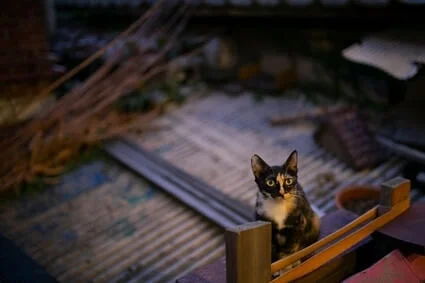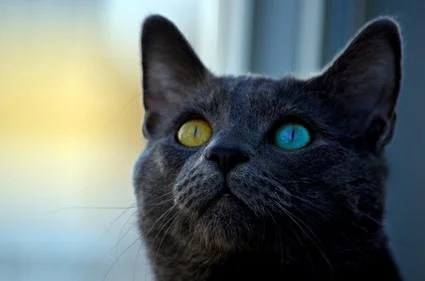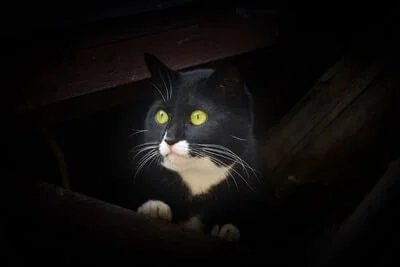Cats move with grace and ease at night, as though able to see perfectly. However, cats cannot see in complete darkness, but they do have superior night vision to humans. A cat’s eyes tend to glow like tiny torchlights.
The glowing effect of a cat’s eyes is known as ‘eyeshine.’ When a cat widens its pupils to adjust to dim illumination, light enters the retina. It then bounces off an additional layer behind the retina, called the tapetum lucidum. This provides the colorful, glowing effect of a cat’s eyes as light reflects from the cells behind the retina.
The color that a cat’s eyes glow at night depends on a range of factors. Common shades include green, blue, and gold. What matters most is that a cat’s eyes can illuminate in gloomy conditions.
Why Do Cats Eyes Glow At Night?
A cat’s glowing eyes could be compared to the red-eye effect of human photography. When exposed to flash photography, our eyes reflect bright light from our retina. This appears red, as the image captures reflections of the blood vessels behind the eye.
Cat eyes usually glow a different, bright color. This is due to the tapetum lucidum, a layer of reflective cells behind a cat’s retina. Tapetum lucidum translates as “shining layer” in its original Latin.
The tapetum lucidum is like a second chance for a cat to see. Cats’ vision revolves around light entering the eye, and the retina then reflects this light. The tapetum lucidum absorbs any light that escaped the retina, improving feline night vision by about 44%.
The glowing effect occurs through this reflection process. As cats have such wide eyes, plenty of light is taken in. The cells found in the tapetum lucidum then bounce this light back, creating illumination. The brighter a cat’s eyes are glowing, the stronger its vision will be in poorly illuminated areas.
Can Cats See in The Dark?
The feline eye is large and round, designed to optimize peripheral vision. In addition, this improves feline night vision. The size of cats’ eyes ensures that they absorb and reflect even the dimmest light.
Streetlamps, or even the light of the moon, will provide a cat with sufficient illumination to see well. This means that a cat can detect predators and hunt by night. Also, cats can feel their way around in the dark using their whiskers.
Cats’ eyes glow like small but penetrative flashlights in the gloom. This may look a little eerie, but it is a positive thing as it means that your cat’s night vision is operating at full capacity.
Why Do Cat’s Eyes Glow Different Colors?
The color that a cat’s eyes glow in the dark depends on various factors. The pigmentation of the eyes and fur are prominent influences. Age will also change the color of a cat’s eyes at night. As the cat grows older, the tapetum lucidum becomes less impactful.
You may find that your cat’s eyes glow a different color to their usual shade. The illumination of a cat’s eyes is not the iris itself. It is a composition of cells found in a cat’s tapetum lucidum, which magnifies this coloration.
The most common elements found in a cat’s tapetum lucidum are zinc and riboflavin. The latter, in particular, is common in the feline eye. An excess or inadequacy of these cells will influence the eye color at night.
Cats Glowing Eyes Green
Green is the most common color for feline eyes to glow in the dark. This is partly because shades of green are among the most common eye colors in cats. The following breeds of cat have green eyes in light and dark conditions:
- Abyssinian
- Egyptian Mau
- Havana Brown
- Norwegian Forest Cat
- Russian Blue
- Sphynx
- Turkish Angora
Even if your cat has green eyes, not all feline eyes will glow the same shade. There are subtle differences in shades of green, even within identical breeds and siblings. Also, be aware that alternative iris colors can still glow green at night. This is a response to the cells found in the tapetum lucidum.

Cats Glowing Eyes Blue
All kittens are born with blue eyes. This means that young cats, in particular, will display glowing blue eyes at night. Over time, the color of many cats’ eyes changes. Blue eyes are common in certain adult cat breeds, though. Notable examples of blue-eyed felines are:
- Balinese
- Birman
- Himalayan
- Javanese
- Persian
- Siamese
If your cat’s eyes are usually blue and they glow this color, it’s rarely a cause for concern. However, if your cat has white fur and blue eyes, check for black seal points. This suggests that the cat will retain age-appropriate levels of vision.
Unfortunately, white-furred, blue-eyed cats without these markings can be prone to early blindness. This will lead to eyes glowing red at night. The tapetum lucidum is not functioning appropriately.
Cats Eyes Glowing Yellow
Siamese cats have blue eyes, but their eyes frequently glow yellow or gold. This is a natural quirk of the Siamese breed and isn’t a cause for concern.
In other breeds, yellow eyes can be a symptom of riboflavin in the cat’s diet. Consumed to excess, this vitamin can cause liver damage. Thankfully, such toxicity is rare in felines. Cats naturally have more riboflavin in the tapetum lucidum than zinc.
If you are concerned, increase your cat’s intake of animal meats and fats as this helps the cat ingest more taurine, countering the riboflavin and boosting night vision. A deficiency of this vitamin is more harmful than having an excess.
Cats Eyes Glowing Red
If your cat’s eyes glow red in the dark, it suggests the tapetum lucidum is failing. This creates the same impact as human photography, as discussed previously. Your cat’s eyes are reflecting the muscle behind the retina, but the light is not reaching the tapetum lucidum. This is common in senior cats as the eyes start to degrade with age.
Red eyes could also be a result of a surprising light source. If a cat’s eyes were not expecting to be flooded with light, they will rapidly dilate, leading to a bloodshot appearance. This should be a temporary and not a regular aesthetic.
Cats Eyes Glowing Two Different Colors
If a cat has mismatched eye colors, this perfectly natural. The tapetum lucidum is reflecting the varying core colors. If you only notice this from certain angles, it is just the light reflecting from different positions. If the issue occurs suddenly, its vision may be failing in one eye.
Cat’s Eyes Don’t Glow in the Dark
A cat’s eyes should always glow in dim conditions. If your cat’s eyes fail to illuminate in gloomy conditions, it may be struggling to see well.
A lack of bright color suggests that light is not reaching the retina. This, in turn, means that light is not reaching the tapetum lucidum. As a result, your cat will struggle to see in the dark. These circumstances suggest a generic vision problem. Causes of eyesight issues in felines include:
- Glaucoma
- Conjunctivitis
- Cataracts in one or both eyes
- Viral Infections
- Taurine insufficiency
- Vitamin A insufficiency
The tapetum lucidum needs some light to reflect. Cat eyes are no more functional in pitch darkness than those of a human. Equally, if you switch on a light, the cat’s eyes should narrow in self-preservation. This prevents light from reaching the retina and tapetum lucidum.
You can check your cat’s vision at home. Do so during daylight hours, when your cat is awake and alert. Techniques for home eye tests include:
- Shining a laser pointer in front of your cat and checking for a reaction
- Dropping a feather (or other light, silent object) and checking if the cat hunts it
- Placing soft, non-dangerous objects in your cat’s path to food, water, and litter
- Shining a dim torch into your cat’s eyes and checking to ensure that the eye contracts
- Watching your cat negotiate cat trees and stairs, ensuring that it moves confidently
If your cat does not respond to these stimuli, you should consult a vet. As explained by Vision Research, temporary light blindness can be reversed.

Cat’s Eyes Glow During Daylight
A cat’s eyes should only glow at night, especially for prolonged periods of time. If your cat’s eyes seem to glow during the day, in bright light, something is amiss. This suggests that your cat’s pupils are unnecessarily dilated, attracting more light than is required. When faced with a direct light source, cats should narrow their eyes. Explanations include:
- Consumption of toxins
- Stress and anxiety
- Hypertension (high blood pressure)
- Key-Gaskell Syndrome
- Diminishing eyesight
Occasional eyeshine during daylight isn’t a medical concern. Your cat could have widened its eyes due to heightened interest or fascination, perhaps because it’s spotted prey using its peripheral vision.
A cat’s eyes glowing in the dark is not spooky or sinister, even if this visual is often associated with Halloween. It’s all part of functional feline eyesight during the night or gloomy conditions.

